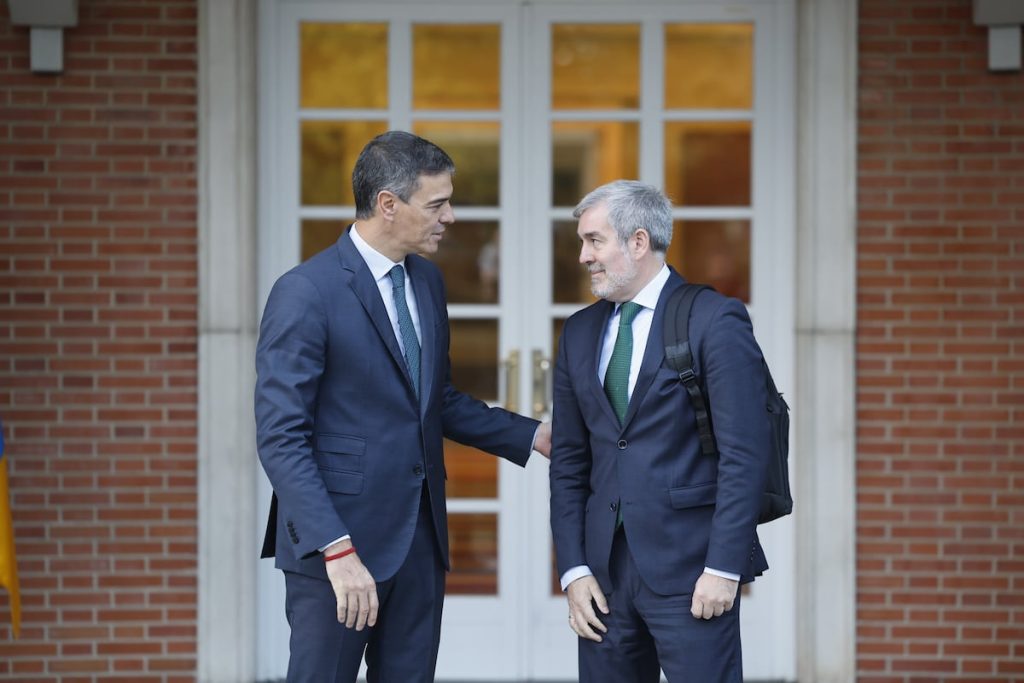The meeting between the President of the Government, Pedro Sánchez, and the President of the Canary Islands, Fernando Clavijo (Coalition Canaria), was much better than expected even by La Moncloa. Sources from the Government and the presidency of the Canary Islands agree that the meeting was conducted in a very good tone and both sides came closer after weeks of tension in which Clavijo criticized the Government and approached Alberto Núñez Feijóo, with whom he signed an agreement to pressure La Moncloa. However, the breakdown of negotiations for the distribution of over 5,000 underage immigrants that are accumulating in the Canary Islands, which the PP unilaterally decided on last Saturday -no one notified Clavijo, who found out through the press, like everyone else- has changed the political situation and the meeting on Thursday has further shifted it.
Throughout the week, the Canary Islands president remained silent waiting for his government partner to find a solution with the national leadership of the PP. The parliamentary debate on Wednesday, where Feijóo hardly spoke about immigration despite it being a thematic request of his, and the meeting where Sánchez offered immediate help in the form of 50 million euros for the Canary Islands to tackle the migration crisis and opened up to providing the almost 160 million requested by Clavijo as compensation for the accumulated situation in 2022 and 2023, have completely changed the situation. Now Sánchez and Clavijo have united, at least temporarily, with a common goal: pressuring the PP to return to the negotiation table to seek a pact for the distribution of underage immigrants.
Clavijo committed in the meeting with Sánchez -and later publicly stated- to call Feijóo to try to convince him to return to the table. The Government hopes he will do so immediately and trusts that Clavijo will succeed in convincing him. From there, negotiations would resume. In exchange, the Prime Minister showed willingness to solve the problem and offered immediate financial aid to the Canary Islands government and a meeting between Clavijo and María Jesús Montero, Minister of Finance, to discuss larger amounts. This negotiation also opens the door for Coalition Canaria to approach the Government and support the Budget if the negotiation with Junts is unblocked and the Budget becomes a reality.
Clavijo made it very clear in his public statements and his inner circle reiterated it privately that he will not break the Canary Islands government, which he co-runs with the PP. The CC leader always defended the actions of the Canary Islands PP and directed his reproaches towards Génova, a way of preserving the stability of the regional government. He stated, “I have not been able to speak [with Feijóo], but we will have that conversation. The Vice President of the Canary Islands government [from the PP] is just as committed as I am. The PP of the Canary Islands has acted with loyalty. Now we need to discuss the need to restore understanding.” The Minister of Territorial Policy and former president of the Canary Islands, Ángel Víctor Torres, was also clear in La Moncloa: “The will of the Spanish Government and that of the Canary Islands is clear: that the PP returns to the dialogue table. We have not walked away and we will not do so.”
On the other hand, Génova remains anchored in its maximalist position and wants to bring back the agreement signed between Feijóo and Clavijo on September 10, which included the demands of the popular party to accept a legislative change imposing the distribution of minors arriving mainly in the Canary Islands, Ceuta, and Melilla, affecting the reform of article 35 of the immigration law that did not advance in July in the Congress due to the PP’s vote against it. The PP’s leadership asserts publicly that these conditions go hand in hand with the reform of article 35, and that any agreement must include all these requirements. However, sources from the presidency of the Canary Islands claim that negotiations focus on how to devise the mandatory distribution of underage migrant children, downplaying the other demands, which would be addressed later. This position aligns with that of the Canary Islands PP, with whom they share government in the archipelago.


